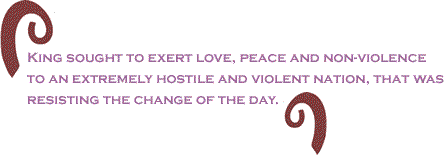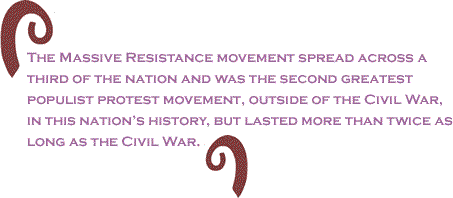| The
monument to 20th Century social change leader, and some
say 20th Century Prophet, the Rev. Dr. Martin Luther King,
Jr., was finally dedicated on the National Mall. On the
16th Anniversary of the Million Man March, the President
of the United States reminded us that King�s struggle for
social change was a protracted one.
People
forget that the Civil Rights Movement was actually a counter-movement
to the ten year long �Massive Resistance� that took place
from 1954 to 1964. Called Massive Resistance, it was an
organized movement to reject and resist the U.S. Supreme
Court�s decision in the Brown vs. Board of Education
case, outlawing �Separate But Equal� or de jure segregation
(racial separation by law).
The
movement wasn�t just a grassroots reaction. The resistance
was from Congress to Statehouses to local government, who
defended the culture and the norms of Jim Crow. One hundred
and one Southern Congresspersons (82 House members and 19
Senators) signed �The Southern Manifesto� in 1956 stating
that the Supreme Court had overstepped its bound and had
infringed upon �States Rights.� It also called for the impeachment
of Chief Justice, Earl Warren.

The
Massive Resistance movement spread across a third of the
nation and was the second greatest populist protest movement,
outside of the Civil War, in this nation�s history, but
lasted more than twice as long as the Civil War. More than
300 books have been written about the Civil War. Less than
a dozen have been written about Massive Resistance, largely
because many of the �resisters� are still living and are
trying to erase that bitter and volatile history. It is
a history that can never be erased and never be run from
because of the counter-resistance movement King led and
the ugly way this period ended. Martin Luther King, Jr.
will always be a scar on our nation�s conscience.
 Why?
Because King sought to exert love, peace and non-violence
to an extremely hostile and violent nation, that was resisting
the change of the day. King exhausted every peaceful remedy
over a thirteen year period to change the mentality of a
racially deranged nation - some suggest to much avail while
others suggest to no avail. The reality is that America
never seriously took up a civil rights bill until King was
on the scene and pulled back the cover on southern racial
hostilities with the Birmingham marches in 1963. This compelled
John F. Kennedy to introduce civil rights legislation and
many suggest it was only passed in memoriam to the late
President as implored by his successor, Lyndon Johnson -
the first Southern President since Andrew Johnson after
Lincoln was assassinated. By the way, the 13th Amendment
was also signed in memoriam to Lincoln who was killed by
a confederate sympathizer. Guilt ended slavery, and guilt
put an end to emotional segregation. The Civil Rights Act
was signed in 1964, a full ten years after Brown and
that�s when the signs came down, but it only intensified
the country�s distain for King, who was ultimately killed
in the midst of an anti-poverty movement while giving support
to striking sanitation workers in Memphis, Tennessee in
1968. America knew things had gone too far, but the �King
of Love� was dead. Why?
Because King sought to exert love, peace and non-violence
to an extremely hostile and violent nation, that was resisting
the change of the day. King exhausted every peaceful remedy
over a thirteen year period to change the mentality of a
racially deranged nation - some suggest to much avail while
others suggest to no avail. The reality is that America
never seriously took up a civil rights bill until King was
on the scene and pulled back the cover on southern racial
hostilities with the Birmingham marches in 1963. This compelled
John F. Kennedy to introduce civil rights legislation and
many suggest it was only passed in memoriam to the late
President as implored by his successor, Lyndon Johnson -
the first Southern President since Andrew Johnson after
Lincoln was assassinated. By the way, the 13th Amendment
was also signed in memoriam to Lincoln who was killed by
a confederate sympathizer. Guilt ended slavery, and guilt
put an end to emotional segregation. The Civil Rights Act
was signed in 1964, a full ten years after Brown and
that�s when the signs came down, but it only intensified
the country�s distain for King, who was ultimately killed
in the midst of an anti-poverty movement while giving support
to striking sanitation workers in Memphis, Tennessee in
1968. America knew things had gone too far, but the �King
of Love� was dead.
Killing
King almost assured America would burn in hell as over 200
cities rioted, but three days later came the Fair Housing
Act and a watered down anti-lynching act (America has never
passed a stand alone anti-lynching law in its history) as
this post-mortem politic continued. The �after the fact�
legislation was passed in memoriam to King, but the scars
over King�s death run deep. In the 20th Century, they gave
him a federal holiday and have co-opted �the dream.� King
meant different things to different people, but one thing
is for sure�America, black and white, had not gotten over
King�s death - not if you have any sort of a conscience.
With the monument, the post mortem �In Memoriam� for Martin
Luther King, Jr. continues almost a half a century after
his death. Celebrating him in death more than in life but
this is significant.
America�s
guilt seems to always arrive a minute too late after someone
takes it a little too far. In the case of Martin Luther
King, Jr., it was 43 years late�but not too late to remind
us what King truly ment to the social evolution of the nation.
Maybe the nation had not gone far enough in acknowledging
what it had or in what King had done. America builds monuments
to its heroes, a constant reminder of the contributions
such heroes have made to society. The National Mall is reserved
for Presidents and war heroes�mostly Presidents though.
The greatness of America is in the men who built it and
the men (and one day women) who defended its truest creed,
liberty.

The
monument suggests that Martin Luther King, Jr. is now a
certified and documented �National Hero,� in perpetuity,
for everyone who ever visits the national mall from here
on out. He probably is the only one (Lincoln included) who
demanded liberty AND justice for all people. King
took the �White Only� sign down off the nation�s most hallowed
ground - its national mall. I mean, we could go there but
only to look at other people�s heroes - who we were TOLD
was ours too - but we only have suspect evidence of that.
Still, we couldn�t put up any statues of our own�until this
past weekend. King is the first non-President, non-war hero,
non-WHITE MAN on the mall. He�s also the first (mostly)
privately funded monument (but that�s another article).
If the people didn�t make it happen, it would�ve happened.
It meant that much to us. Hopefully, it means that much
to the nation. They only put these up every 40 or 50 years.
Martin
Luther King, Jr. is now more than a scar on the nation�s
conscience, that we artificially celebrate once a year.
He is now in his rightful place as a national hero who changed
the course, and the culture, of this nation. He now has
a physical space in this nation�s capital�Like all the other
MAJOR heroes we honor, on the nation mall.
A
true �American Hero,� with a monument to match his accomplishment�and
his sacrifice�for the good of the nation. Let the record
now reflect it.

BlackCommentator.com
Columnist,
Dr. Anthony Asadullah Samad, is a national columnist, managing
director of the
Urban Issues Forum
and author of
Saving The Race: Empowerment Through Wisdom. His Website is AnthonySamad.com. Click
here
to contact Dr. Samad. |

